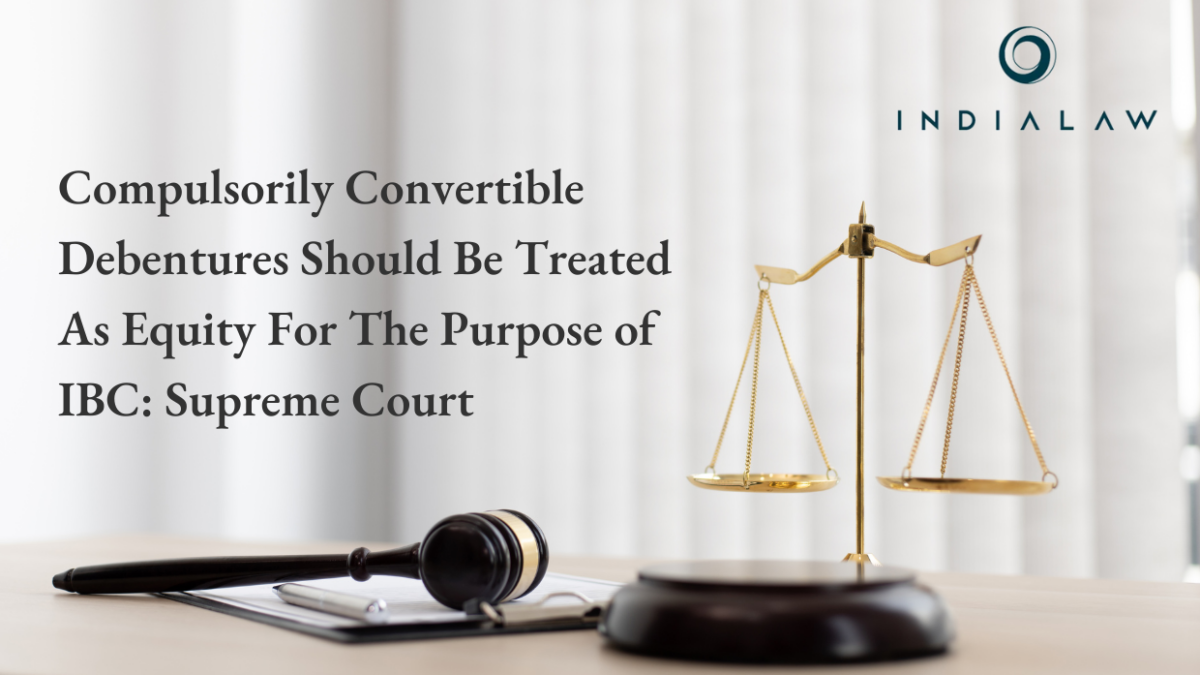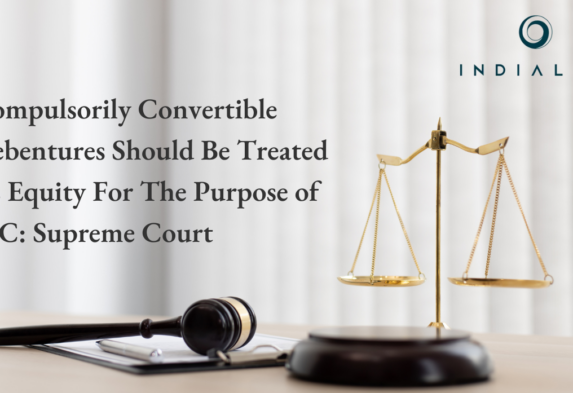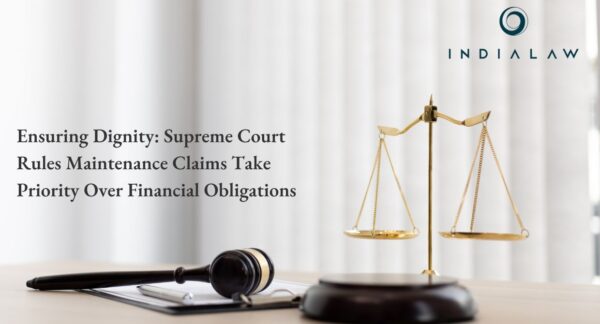Compulsorily Convertible Debentures Should Be Treated As Equity For The Purpose of IBC: Supreme Court


The debatable issue that arises in corporate laws pertaining to compulsory convertible debentures (CCDs) is whether such CCDs fall under the ambit of financial debt under Insolvency and Bankruptcy Code, 2016 (IBC) or not. A similar issue came up in a recent case before the Supreme Court.
Debentures: Meaning
Debentures are the financial debt as per definition given under the IBC. However, according to Section 71(1) of the Companies Act, 2013, an option is provided to the company to issue debentures with a convertible option of debentures into shares during redemption. Such debentures are called compulsory convertible debentures.
Compulsory convertible debentures (CCD(s)) are the instruments that are issued by companies at a fixed rate of interest that are mandatorily convertible into equity at a specific time period.
M/s. IFCI Limited v. Sutanu Sinha & Ors. (Neutral Citation: 2023 INSC 1023)
Facts of the Case
The National Highways Authority of India (NHAI) had awarded the Highway project in terms of a Concession Agreement executed between it and the IVRCL Chengapalli Tollways Ltd (ICTL). ICTL was a subsidiary Company of IVRCL with a holding of 100% share capital. A group of lenders had provided term loan facility to the ICTL for execution of documents including the company loan agreement.
The project was to be financed through equity infusion by IVRCL. The financing for the project was to be obtained through CCDs. M/s IFCI Limited (Appellant) subscribed to the CCDs, although other debentures were being executed simultaneously. The date of conversion of CCDs into equity was December 2017, however, formal allocation of shares was not done after that.
At the request of ICTL, IFCI had agreed to subscribe to the CCDs amounting to Rs. 1,25,00,00,000/- in terms of a Debenture Subscription Agreement (DSA). The project faced financial difficulties and a one-time settlement was offered and agreed, but the same was not honored.
Corporate Insolvency Resolution Process (CIRP) was initiated against IVRCL under the IBC. It was claimed by IFCI that the amount that was due had a status of a debt. IFCI lodged a claim on that behalf, however, Resolution Professional rejected the entire claim.
IFCI filed an application before the National Company Law Tribunal, (NCLT) to challenge the decision of the Resolution Profession. The NCLT rejected the application filed by IFCI.
Against the order of the NCLT, an appeal was filed before the National Company Law Appellate Tribunal (NCLAT) by IFCI. The same was also rejected and the Appellant moved to the Supreme Court (SC).
The issue before the Court
Whether the Compulsory convertible debentures be considered as a debt or as an equity instrument?
Contentions of the Parties On behalf of the Appellant
The counsel on behalf of the Appellant submitted that if the investment of the Appellant is treated as equity and not debt then the Appellant has been left remediless. Even after the maturity date of the CCDs, the investment of the Appellant was really treated as a debt on account of the financial difficulty of ICTL. The counsel further pointed out that the conversion of CCDs to equity actually became impossible due to the insolvency of the ICTL and thus, the entire principal amount along with the interest became due and payable.
On behalf of the Respondent
The counsel on behalf of the Respondent draws the attention of the Court to the Concessionaire Agreement with the NHAI wherein equity is defined as the sum expressed in Indian Rupees representing the paid-up equity share capital of the Concessionaire for meeting the equity component of the Total Project Cost and shall include convertible instruments or another similar instrument. The counsel submitted that the concept of convertible instruments including CCDs falls within the definition of equity. The financing plan of the Respondent itself envisaged CCDs as part of the equity portion of the funding. The counsel further submitted that ICTL does not have a liability or obligation towards the Appellant because the Appellant is actually an equity participant and does not have a debt to be repaid.
Findings of the Supreme Court
The Supreme Court stated that “the definition of debt under Section 3(11) of the IBC would be the liability or obligation in respect of a claim which is due from any person. ICTL does not have a liability or obligation qua the appellant because the appellant is actually an equity participant and does not have a debt to be repaid. The success of a commercial venture pays benefit to the equity participants but with income, which would not inhere in case of the failure of the venture.”
The Supreme Court highlighted that if it was a simpliciter debenture, then the same must have fallen under a financial debt along with bonds etc. The Supreme observed that we must note that the complexities of commercial documents depend on the nature of business. These are not layman’s agreements, but agreements vetted by experts and thus each of the parties knows its obligations and the benefits which can arise from the agreement. We thus find it difficult to read into or add to what the document says about a CCD”.
The Supreme Court stated that it is very unfortunate that the Appellant has left with such a situation where there is nothing, no assets or funds to recover from the sponsor company.
The Supreme Court further pointed out that “Commerce has evolved. The documents forming the base of commerce have also evolved and created a hybrid nature of documents.”
The Supreme Court underscored that “What was earlier labelled as a debenture, now has hybrid versions such as partly convertible debentures, optionally convertible debentures and Compulsorily Convertible Debentures (CCDs). We may note that traditionally debentures were treated as a floating security with a covenant for payment on a specified date”.




